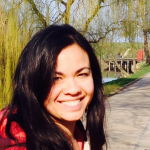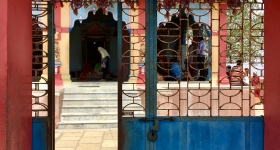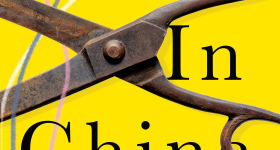My first memory is of getting bitten by a dog. His name is Shiro, which means “white” or “castle” or “generation” in Japanese, depending on how it is written. Shiro has long white hair, blue eyes and a grayish-pink nose. I am 3 years old and he is just above my height, but I can still look him in the eyes. I believe we understand each other, our arrangement. I believe, at age 3, I’ve earned his subservience. He carries himself proudly. Majestic, like a horse.
One day, when no one else is around, in the backyard beside the cobblestone fence, as he lowers his head to drink from a shiny porcelain dish of water, I try to climb him. He growls and bites me on the arm — not hard, but just enough to jar me into consciousness. He doesn’t frighten me. He embarrasses me; shames me. And as a small child, an only child accustomed to endless doting, these strange emotions won’t be tolerated. I cry and run to my mother, demanding her sympathy. I don’t tell her why I’m crying. I’m afraid that if I tell her, she’ll scold me worse than the dog did.
Shiro is not to be ridden like a horse.
***
Shiro was my obaasan’s dog. Oba, my grandmother, my mother’s mother, found Shiro when he was still a puppy, eyes closed, curled up into a ball, quivering on a pile of garbage.
Often, at night, Oba pushed a cart through the streets of Kadena, a town located on the island of Okinawa, where my mother was born and raised, where I lived for six months when I was 3 years old. When the air thinned and cooled — when the sounds of jets, helicopters and gunfire from nearby military bases quieted — Oba pushed a cart through the streets and rummaged through trash heaps, searching for cans and bottles to sell, scraps of wood and metal to reuse. She lived in a house with a roof made of tin and a floor raised from the mud by cinder blocks, with a single room for cooking, eating, drinking, sleeping and playing cards and a backyard for bathing and growing the sweet potatoes she ate for every meal. She lived almost all her life in this house, the house where my mother grew up, the house my grandfather built after their previous house was destroyed during the battle.
***
The Battle of Okinawa. That is how most of us have heard of Okinawa. As a battle fought and won and quickly disregarded. Not as a battle on which our entire contemporary history depends, from which we are still recovering.
It began in April of 1945 and lasted 82 days. In Japanese, the battle is sometimes referred to as tetsu no ame. In English, the phrase means “typhoon of steel.” The Okinawans simply refer to it as “The Battle.” Although a conquered nation for many centuries — first as a tributary of China, then as a colony of Japan — Okinawa had never known such carnage. For 82 days, thousands of planes dropped thousands of bombs on the island, burning and crushing countless creatures, plants and buildings. For 82 days, 183,000 troops invaded the island, wielding tanks and guns, throwing grenades and shooting into hiding places. One-third of the population — 122,000 Okinawans — were killed. That does not account for those who died of wounds, of illness, of starvation. That does not account for those who were forced to commit suicide. Of those killed, some of them were conscripted soldiers called Boeitai, men as old as 70 and boys as young as 12, ordered to fight in the front lines. Some of them were members of relief teams called Giyutai, girls as young as 13, ordered to cook and tend to the wounded. The rest were civilians — 94,000 civilians. Who died in a war they didn’t choose, sacrificed to protect Japan, the precious mainland.
Many Okinawans believe that those who died had died in vain. Or rather, what they refer to as “worse than a dog’s death,” inujini.
When news came that Okinawa would soon be attacked, Oba lived by herself with her four children, my mother’s older brothers and sisters. My grandfather, conscripted five years earlier, was somewhere in Korea, being held prisoner. When the sirens blared days before the troops landed, before the ships could be seen from shore, Oba and her four children — her two sons, ages 8 and 5, and her two daughters, ages 11 and 3 — grabbed sacks of potatoes they had been gathering and storing for months. They fled to the South. They hid in a cave while the ground shook with each explosion, while their home crumbled and turned to ash. They wandered from cave to cave, while their sacks emptied, while their clothes loosened and shredded from their shrinking bodies. For two years after The Battle, they wandered from camp to camp, slept in tents or under tarps or mounds of debris. They ate what they could scavenge or what the occupying U.S. military supplied as rations. They collected rain and drew from low, muddy wells for drinking. They bathed in the ocean. When my grandfather finally returned from Korea, he was a different person.
Somehow, Oba was able to keep herself and her four children alive and unharmed all that time. A story I wish she told me. Yet these memories are impossible to forget, regardless of whether we actually lived through them. I believe they stay in our bodies somehow. As sickness, as addiction, as poor posture or a tendency toward apology, as deepened capacity for sadness or anger. I believe they are inherited, passed on to us like brown eyes or the shape of a nose.
***
In 1948, three years after The Battle, my mother was born. She was born into poverty and chaos. She was born into a family, an entire people, overwhelmed by violence and grief. When my mother was born, Okinawa was still considered an “enemy territory.” That meant that Okinawa was still a vast ruin of decay and rubble. That meant that U.S. troops still guarded and patrolled the dump of an island, giving out candy and popcorn, crackers and cans of red mush. Some of them gave the prettiest girls bright new clothes to wear and called them “honeys.” Some of them broke into homes, robbed and raped Okinawans inside their own homes, because there were no laws against it — no laws at all.
In 1952, three years after my mother was born, around the age she would have formed her first memory, Japan surrendered rule of Okinawa to the United States in exchange for its own sovereignty. She witnessed the military move in with full force, constructing immense complexes of bases. She watched forests and fields, wetlands and beaches become concrete. She watched farmers and fishermen, carpenters and potters, cooks and shopkeepers become labor. Her brothers were hired to help build the bases. Her sisters served food in the cafeterias. Oba cleaned barracks. My grandfather also cleaned barracks, but mostly he just stayed in bed, too sick with grief, humiliation and addiction to do much of anything else.
Growing up, my mother heard the constant sounds of jets, helicopters, gunfire, the voices of foreigners in the streets and stores. But she did not remember what her home was like before. She was never reminded how life could be better; only warned how it could be worse.
***
For many years after The Battle, in order to supplement her income, Oba cooked breakfast, lunch and dinner for a couple of orphaned neighbors a little older than her own children. She cooked on a portable gas stove while they drank tea and played cards in the same room. They paid her one dollar to sit on her floor and eat food she prepared. Not much, just potato and broth. Oba needed the extra money and they needed someone to care for them.
Not long after her own children moved out and moved away, after my grandfather gambled and drank himself to death, Oba found Shiro on a pile of garbage and brought him to her home. She held him like a baby and fed him with a bottle. Then he grew older and bigger, and they would sit together at the same table, which was already low to the floor, perfect for a dog, and share from the same bowl. One piece of potato for her. One piece for him. She would slurp some broth and give the rest to him. Back and forth. For every meal.
Shiro trotted beside her as Oba pushed a cart through the streets.
Shiro was not to be ridden like a horse.
***
My first memory is of being bitten by a dog. That is all I can remember of the time I lived in Okinawa for six months when I was 3 years old. There are many photographs of my aunts and uncles holding me and smiling, my cousins holding me and smiling, Oba carrying me on her back and smiling. We are smiling not because we are posing for photographs, but because we are happy. I am a small child and I don’t know what sadness is yet, and therefore I make everyone happy.
There is a photograph of me at a beach, lying on my stomach on the sand, wearing a red and white polka-dot swimsuit and sunglasses much too large for my face. I am laughing, probably because the person behind the camera is laughing. There is a photograph of me in a park, standing on a pair of giant bronze statue boots, each boot bigger than my whole body, wearing braids and bow-shaped barrettes in my hair, arms crossed and brow furrowed, trying to look tough, probably because the person behind the camera is telling me to look tough. We are having fun, pretending and playing together, because I am small like a doll and everyone loves to play with me. But I do not remember any of these moments. They are just photographs my mother had taken and framed and hung on walls or put on shelves around the house. They do not belong to my life. They belong to hers.
What I do remember is walking through the Newark Airport. I am walking with my mother, staying very close to her, holding her hand. A man walks beside us. He smiles a lot and wants to hold my hand, too, but I won’t let him. I won’t let him because I don’t know him. I don’t remember him because my first memory is of getting bitten by a dog. My mother tells me the man is my father. She tells me that he stayed behind, in the United States; that he was traveling the country looking for a better job and a better place for us to live. That is why we had to live with my aunt in Okinawa for six months. That is why we have returned. Because the man is my father and her husband. We belong with him.
She tells me kare-wa anata-no otōsan desu. She tells me in Japanese, because back then I could understand and speak Japanese. I hold my mother’s hand tighter, hiding from him behind her. And for a long time, that is the closest I ever felt to my mother. When I was still in her world. When I could still understand and speak Japanese.
***
In 1972, without a single vote cast in Okinawa, the island reverted, or rather, was "sold," back to Japan for the sum of $685 million.
The people of Okinawa celebrated. They sang and danced. They marched in parades and waved flags. They thought they were done with the U.S. military, done with the bases. But the bases remained.
Since 1972, 9,000 crimes committed by U.S. military personnel — including murders by shooting, by stabbing, by strangulation; including theft and arson; including rape and sexual assault — have been reported in Okinawa. One hundred sixty-nine court martial cases for sexual assault — a world record — have been reported in Okinawa. In 1995, three U.S. Marines kidnapped and raped a 12-year-old girl. They rented a car. They dragged her into the backseat. They bound her hands and feet with duct tape. They taped her eyes and mouth shut. They drove her to a deserted field and took turns. They were convicted in a Japanese court and sentenced to seven years in prison.
In 1995, 96 percent of Okinawans voted for complete removal of U.S. military bases. But the bases remained.
Today, 20 percent of Okinawan land mass is still controlled by the U.S. military. More land controlled by a foreign military than in any other country in the world.
***
Okinawa became known as “R&R Island,” a place where troops could relax and recuperate in between stints at war. My father was stationed in Okinawa after he served two tours of duty in Vietnam. He met my mother in Kadena, just outside an army base, at the Blue Diamond Bar, where she worked as a waitress, getting paid one dollar for every drink she got a serviceman to buy for her.
And here is where history becomes mine, alive in me.
He sits on a stool. He is confident, strong. He smiles with straight white teeth and flashes a wad of crisp cash. He orders a bourbon on the rocks in a language and accent that signal power. She sits next to him. She is petite, slender. She smiles and twirls a few strands of her dark, dark hair, smooth as silk, flowing down to her waist like water.
Is love possible in a place like this, in a situation like this, between two people from separate worlds, on opposite sides of war and conquest? Perhaps. But I will never really how it began. Only how it ends.
Perhaps to someone who had grown up eating sweet potatoes for every meal, sleeping in the same room as her parents and six siblings, he must have seemed like a way out. Perhaps to someone who had just spent four years in combat, she was just too beautiful and vulnerable to resist. He had to save her.
And so, a year later, in 1974, two years after the reversion, one year before the Vietnam War concluded, they married on the island. Marriage to locals was discouraged, but as a commanding officer, my father granted his own approval.
It was a small ceremony. Only Oba attended. My grandfather was too sick. My uncles were too angry. My aunts were too sad, scared, maybe jealous, that their sister was marrying an American, a soldier; that their sister was leaving. Oba managed to scrounge enough money to rent two traditional wedding kimonos and hire a photographer to document the event.
My mother has seen her mother twice in the 42 years since she left.
***
While my mother and I lived in Okinawa for six months, my father found a job as a management consultant for a firm called The Princeton Group, giving problem analysis and operational advice to senior executives based on Wall Street. He found a place for us to live in Plainsboro, New Jersey, in a condo in a complex of condos. Each building uniformly square, uniformly painted gray and blue, surrounded by parking lots and giant fences. The complex of condos shared a playground, two tennis courts and a pool. In many ways, it resembled a military base.
There was a process, I’m sure, but in my memory, almost immediately, I joined my father’s world. A world in which my mother could never fully participate.
I remember she dressed up as a clown for Halloween once, but only once. I remember she helped us decorate the Christmas tree, but she wanted to wrap the lights too close around the trunk, not dangling closer to the edges of the branches, as shown on television. “What about here?” she asked. And quickly, I moved the ornament to another branch.
I remember an older girl from our neighborhood flung a shoe at my chest, knocking the wind out of me, and threw a sharp pebble at my face, slicing the bridge of my nose. I cried and ran to my mother, but she could see I wasn’t hurt too badly and did nothing.
My father came home from work, and after I told him what happened he went on a hunt for this older girl. He charged through the neighborhood, still wearing his three-piece suit, searching every alley and alcove of the complex. He finally found her in the playground, swinging on a tire swing, by herself. He screamed and yelled at her until he was red in the face, until she trembled with absolute terror, until she cried and ran to her mother, and then her mother came pounding on our door, demanding an explanation. My father told her that he would have struck this older girl if she were his own child and if she were a boy. He told her that bullies must be bullied, otherwise they will never learn.
My father believed in the code of heroes, of men, of strong men who protected the weak. He believed in sacrifice and honor. He believed it was his duty to bully the bullies, humble the tyrants, correct the Communists. He possessed an irresistible certainty of right and wrong. He possessed the heritage of victory, the assurance of someone who knew how it felt to do more than survive.
He always made me feel safe and protected in his world.
***
We lived in Plainsboro, New Jersey, for a year and a half. During that time, my father would travel to Manhattan on business trips for days, sometimes a full week. I could only see my father on weekends. I ached from missing him.
When my father was home, he would take me to the pool and we would swim laps. I clung to his shoulders and his body held me above the water. My mother didn’t want to go to the pool. She seemed afraid of the water, the neighbors. The water was saturated with chemicals and the neighbors showered after they swam in the pool, not before, which disgusted her. The neighbors kept asking my mother to repeat herself, which annoyed her a great deal and frightened her. And her fear scared me, too. She didn’t belong. That meant I didn’t, either.
My father would watch Bugs Bunny cartoons with me. We sat on the couch together and ate carrots whole as if they were plucked from the ground. My mother would peel and slice the carrots. She couldn’t understand why I preferred the carrots whole. I couldn’t explain why.
Sometimes I would cry and cry from missing my father, and my mother would have to call him at work because only his voice could calm me. His voice. The voice that read The Ugly Duckling and The Velveteen Rabbit to me whenever I asked and so often I had memorized the words. I remember one day, when I was 4 years old, I asked my mother to read these stories with me. I wanted her to listen and watch. I wanted to show off. We sat on the floor of my bedroom with the books spread between us. I recited the words and turned the pages.
“You don’t need me,” she said, bitter and accusing.
I didn’t bother to deny it. Even at that age, we both knew it was true.
I spent most of that year and a half with my mother, but I only have vague recollections of her. She was a ghost who suddenly appeared in rooms, holding a stack of carefully folded laundry or pushing a vacuum. She swept and mopped the floors, scrubbed the counter tops, while I played with Barbie dolls that didn’t look anything like me and even less like her. I remember she bought me a Mariko doll, the Asian-looking Barbie doll, but I was not amused.
We spent most of that year and a half in silence, except for the music, which she blasted on the stereo while she cleaned, if I wasn’t watching cartoons. She loved Elvis, Neil Diamond and Tom Jones. Probably because their balmy voices reminded her of the lounge singers that were popular in Japan. In the car, when we drove around on errands, she let me rewind and replay “What’s New, Pussycat?” again and again because that song was my favorite.
She taught me how to fold paper into the shape of a bird.
***
Often, at night, my mother got very drunk. She would call her mother and sisters in Okinawa, talk on the phone for hours, then hang up and burst into tears. For a long time, I thought my mother was weak. Because she couldn’t speak English very well or read. Because she was afraid of pools and neighbors. Because she got very drunk and sobbed unconsolably and had to be carried, sometimes dragged, to bed.
I didn’t realize that she couldn’t change history, that history wasn’t her fault. I didn’t realize that she could never escape the legacy of defeat, of trauma, perpetuated by her very own husband and daughter. That I could never escape, either.
Now, whenever I try to comprehend her loneliness, I am completely overwhelmed by her strength. She must have longed for that small child in the photographs. She must have ached from missing me.
***
My mother told me I used to understand and speak Japanese. She told me that after we returned to the United States, she would speak to me in Japanese, and at first, I responded, but then I stopped answering, and then eventually, I stopped listening. Everywhere around me, English. Everywhere around my mother, English. I adapted. She could not. So I abandoned her.
My mother told me Oba came to live with us for two months when I was 4 years old. She was supposed to come live with us permanently but the United States, even just the sliver of it called Plainsboro, New Jersey, was too big and cruel for her.
I remember when Oba took me to the pool. She wore her gray hair pulled tight in a bun at the base of her long, skinny neck. She wore a flimsy, floral-printed, button-down shirt and skirt and white zori with white socks. She looked so odd and out of place in my world. She sat on a plastic lawn chair at the edge of the pool while I swam by myself in the shallow end and ignored her. Because she couldn’t speak English. Because she was old and wrinkled. From keeping herself and her four children alive and unharmed through one of the most horrific battles of World War II. From pushing a cart through the streets and rummaging through trash heaps. From watching a husband gamble and drink himself to death. From watching a daughter die and another daughter move far away to another world.
I wish I had made her feel more welcome back then. “Please stay with us, Oba,” I could have said. “My mother needs you. I need you. Teach me Japanese.”
I imagine poor Shiro for those two months while Oba was gone, eating outside with the other dogs. Shiro died shortly after Oba returned to Okinawa. Oba never returned to the United States.










Comments